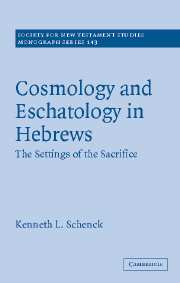Book contents
4 - The Two Ages
Published online by Cambridge University Press: 22 September 2009
Summary
The ‘topical sequences’ of the plot
The previous chapter argued that Ps. 8 gives us the ‘initial sequence’ of the story behind Hebrews' argument, the starting point for understanding the story of salvation. God intended humanity to have glory and honour in the creation. But because of death, humanity does not experience such glory. Hebrews points to the Devil as the one who holds the power of death. Accordingly, we should see humanity's ultimate attainment of glory as the appropriate end of the story, the final sequence of the plot. Hebrews is almost as vague about the particulars of that future glory as it is about the opening sequence when humanity failed to attain it. We can only make educated guesses about its precise nature on the basis of images like the ‘heavenly city’, an ‘unshakeable kingdom’, ‘rest’ and a heavenly ‘homeland’.
For Greimas, any number of ‘topical sequences’ occur between the initial and final sequences of a story. In his analysis, the key topical sequence of a story is when the opponents who prevented the initial success of the plot are overcome. In the case of Hebrews, the key topical sequence is thus when Christ defeats death and the Devil. We would thus expect the key topical sequence of Hebrews to look something like the following:
The structuralist system makes the diagram look somewhat more obtuse than its explanation need be. Its thrust basically amounts to the final part of Heb.
- Type
- Chapter
- Information
- Cosmology and Eschatology in HebrewsThe Settings of the Sacrifice, pp. 78 - 112Publisher: Cambridge University PressPrint publication year: 2007



